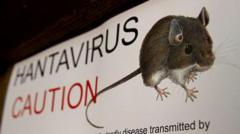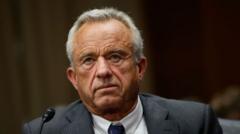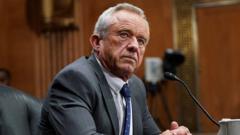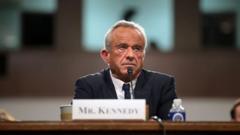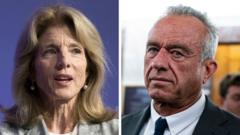Kennedy’s formation of the new Advisory Committee on Immunization Practices (ACIP) has drawn significant scrutiny following his dismissal of the previous committee. The first meeting of the reshuffled panel saw its chair, Dr. Martin Kulldorff, discuss new initiatives focusing on long-approved vaccines for children, igniting concerns about the credibility of the appointees.
RFK Jr. Reshapes Vaccine Advisory Panel Amid Controversy

RFK Jr. Reshapes Vaccine Advisory Panel Amid Controversy
Health Secretary Robert F. Kennedy Jr. has restructured the vaccine advisory panel, raising alarms among public health experts over the qualifications of new appointees.
In a controversial move, Health Secretary Robert F. Kennedy Jr. recently replaced the entire Advisory Committee on Immunization Practices (ACIP) with new members, prompting outcry from the public health community. The newly formed panel convened for the first time on Wednesday, tasked with reviewing long-standing vaccination schedules for children and adolescents. Critics argue that several of the new appointees, including vaccine skeptics, lack essential qualifications and expertise.
The reshuffling of the ACIP occurred on June 9, when Kennedy unceremoniously ousted all 17 previous members and appointed a new group of eight, notably including individuals who have publicly expressed doubts about vaccines. This serious alteration sparked alarm among public health experts, who worry about the potential impacts on vaccine recommendations that influence health policies in the United States.
Dr. Martin Kulldorff, the newly appointed chair, shared during the opening meeting that he was dismissed from his Harvard professorship due to refusing the COVID-19 vaccine, further highlighting the committee's contentious agenda. The panel is set to examine the wisdom of administering hepatitis B vaccines to infants—a preventive measure deemed safe and effective by health authorities—as well as vaccination strategies for measles. Kulldorff's current review of vaccines approved over seven years prior has raised eyebrows within the scientific community, prompting Harvard epidemiology professor Bill Hanage to express skepticism over the committee's approach.
Originally, the panel was expected to vote on new recommendations concerning RSV vaccinations but was delayed in favor of discussing older vaccine safety concerns, including the often-debated thimerosal, which has not been a component of most vaccines for years. Dr. Paul Offit, a former ACIP member, criticized Kennedy's selection process, suggesting that the new committee echoes his own anti-vaccine biases rather than maintaining a diverse range of scientific expertise.
Adding to the unfolding controversy, Dr. Michael Ross was part of the new appointments but withdrew just prior to the meeting due to scrutiny over financial conflicts. Republican Senator Bill Cassidy expressed skepticism toward Kennedy's leadership of the panel, questioning the qualifications of appointees amid the absence of a confirmed CDC director to oversee the committee's outputs.
As the new ACIP embarks on its review of vaccination practices, the implications of Kennedy's choices could shape the future of immunization recommendations in the United States. The upcoming discussions will be closely monitored by health officials and experts as the landscape of public vaccination policy evolves under this new governance.
The reshuffling of the ACIP occurred on June 9, when Kennedy unceremoniously ousted all 17 previous members and appointed a new group of eight, notably including individuals who have publicly expressed doubts about vaccines. This serious alteration sparked alarm among public health experts, who worry about the potential impacts on vaccine recommendations that influence health policies in the United States.
Dr. Martin Kulldorff, the newly appointed chair, shared during the opening meeting that he was dismissed from his Harvard professorship due to refusing the COVID-19 vaccine, further highlighting the committee's contentious agenda. The panel is set to examine the wisdom of administering hepatitis B vaccines to infants—a preventive measure deemed safe and effective by health authorities—as well as vaccination strategies for measles. Kulldorff's current review of vaccines approved over seven years prior has raised eyebrows within the scientific community, prompting Harvard epidemiology professor Bill Hanage to express skepticism over the committee's approach.
Originally, the panel was expected to vote on new recommendations concerning RSV vaccinations but was delayed in favor of discussing older vaccine safety concerns, including the often-debated thimerosal, which has not been a component of most vaccines for years. Dr. Paul Offit, a former ACIP member, criticized Kennedy's selection process, suggesting that the new committee echoes his own anti-vaccine biases rather than maintaining a diverse range of scientific expertise.
Adding to the unfolding controversy, Dr. Michael Ross was part of the new appointments but withdrew just prior to the meeting due to scrutiny over financial conflicts. Republican Senator Bill Cassidy expressed skepticism toward Kennedy's leadership of the panel, questioning the qualifications of appointees amid the absence of a confirmed CDC director to oversee the committee's outputs.
As the new ACIP embarks on its review of vaccination practices, the implications of Kennedy's choices could shape the future of immunization recommendations in the United States. The upcoming discussions will be closely monitored by health officials and experts as the landscape of public vaccination policy evolves under this new governance.








